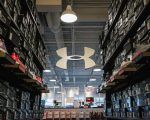
Morgan Stanley highlighted several companies that are prepared to withstand — and even benefit from —consumers’ shifting preferences this holiday season, as inflationary pressures dampen shoppers’ budgets this quarter. “We are underweight the consumer discretionary sector; the lower prices customers are looking for will weigh on company margins and earnings,” analyst Michael Wilson said in a Thursday note. According to Morgan Stanley’s proprietary monthly survey, most holiday shoppers are looking to see 30% discounts, on average, before they begin spending this holiday season. They’re also more likely to keep their holiday budgets roughly unchanged since last year, meaning retailers will be competing for a budget pool that is similarly sized to last year and will have to entice shoppers with more competitive prices. Those who plan to spend more attributed their spending levels to inflation-driven higher prices, while shoppers who plan to cut down on their spending pointed to a decrease in their income and plans to buy less expensive products. Consumers’ increasing preferences for services over goods is also a trend that is likely to remain relevant this holiday shopping, the firm said, pressuring goods-oriented industries while airlines remain the outlier as individuals continue to plan vacations. A strong holiday season should benefit the entire airline industry given the ongoing demand for air travel among consumers across income brackets, according to Morgan Stanley. The firm said it continues to prefer legacy airlines Delta Airlines , American Airlines and United Airlines , as well as low-cost carriers Southwest Airlines and Alaska Air Group , as they have more exposure to international and corporate travel compared to ultra-low cost carriers. Delta is the firm’s top pick in the airline space, analyst Ravi Shanker said, noting the company’s strong brand, premium customer brand and exposure to corporate and international tailwinds as well as its metered growth plans. Shares of the airline have gained 4.5% this year. The stock picked up steam after reporting strong third-quarter earnings last month, when Delta’s president also noted that “robust demand for travel on Delta is continuing into the December quarter” and should fuel total revenue growth of 9% to 12% compared with the same period a year ago. Although the firm is cautious on goods-oriented retailers, the spending slowdown will hit some retailers harder than those that have not planned more conservatively for the future, Wilson said. “Durable goods spending has slowed and that is expected to continue into the holiday season,” Wilson said in the note. “Even if the recent slowdown proves temporary and holiday sales exceed expectations, the larger narrative unfolding is one of the consumer weakening, persisting inflation, and a slowdown in durable goods.” E-commerce has been decelerating since the summer and worsened in October, the analyst said, putting the sector in a weak spot as the softer macroeconomic and more promotional environment hits low-income consumers. Higher-income shoppers are unable to offset this decline in the sector, he added. Morgan Stanley is positive on e-commerce names that are less discretionary and more insulated against macro headwinds, however, spotlighting Amazon and Chewy . Amazon remains the dominant e-commerce name in the U.S. — and remains better-positioned against its peers when it comes to holiday shopping this year. Amazon’s expected 12% growth in the fourth quarter is driven by double-digit growth in U.S. and international segments, which is above the firm’s estimated 8% U.S. e-commerce growth, analysts Brian Nowak and Lauren Schenk wrote. “AMZN’s skew towards high income, repeat and retention user base (~80% of volumes driven by Prime subscribers) also acts as a mitigant to recent macro weakness,” they said. Chewy is also in a good spot, according to the analysts, who believe the pet food retailer has less downside risk with most of its revenue coming from non-discretionary goods in consumables and pharmacy. The company has also planned for a more promotional environment in its fourth-quarter guidance, the firm noted. Shares of Amazon are up 69% this year, while Chewy has lost 45%. Both names have had a strong quarter. Softline retailers have planned conservatively into holiday season and may therefore be under-appreciated at their current levels, lifting Morgan Stanley’s near-term sentiment on retailers. Clothing and apparel are also the category consumers are most likely to include in their holiday shopping carts, according to the firm’s survey. Apparel retailers Urban Outfitters and Abercrombie & Fitch are the most likely winners this holiday season, given their inventory-to-forward sales basis and earnings per share upside potential, according to analyst Alex Straton. Shares of Urban are up 49% for the year, while Abercrombie’s stock has popped 196% in 2023. On the other hand, toys and leisure goods sellers are working against a challenging backdrop, but could come out better-than-feared. Toys could emerge as “relative winner” this season as they become a more top-of-mind purchase for parents during the holiday season, analyst Megan Alexander wrote.








